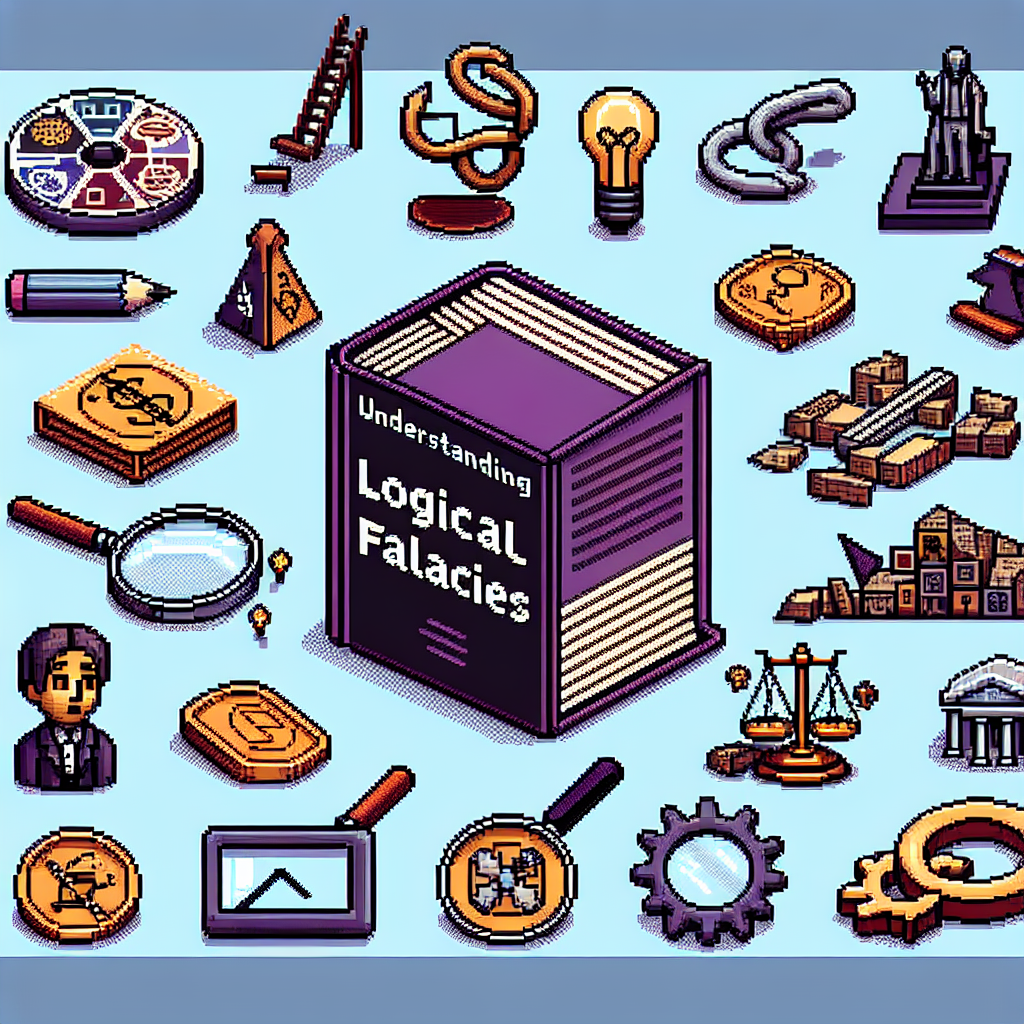Understanding Logical Fallacies
Definition of Logical Fallacy
A Logical Fallacy is a flaw in reasoning that weakens an argument. These fallacies often appear in the form of erroneous connections between ideas. Despite their lack of sound logic, they can be persuasive because they exploit emotional, social, or psychological factors.
Importance of Understanding Logical Fallacies
Understanding logical fallacies is crucial because they frequently infiltrate everyday discourse, whether in politics, advertising, or casual conversation. Recognizing these fallacies enables individuals to critically assess the arguments they encounter, promoting more rational and informed decision-making. Additionally, being aware of fallacies helps prevent the inadvertent use of flawed arguments, thus enhancing personal communication skills and fostering clearer public dialogue.
Purpose of the Article
The purpose of this article is to offer a comprehensive exploration of the various types of logical fallacies, their persuasive nature, and the ways in which they influence decision-making and debates. By shedding light on how these fallacies manifest and can be identified, the article aims to equip readers with the tools necessary to navigate complex discussions more effectively. Moreover, it seeks to encourage critical thinking and ethical communication practices, ultimately nurturing trust and credibility within public and personal exchanges.
Overview of Logical Fallacies
Common Types of Logical Fallacies
Understanding the various types of Logical Fallacy is crucial in identifying flaws in arguments. Common fallacies include ad hominem attacks, where the focus is on the person rather than the argument, and straw man arguments, which misrepresent an opponent’s stance. Additional examples are circular reasoning, where the conclusion is part of the premise, and the slippery slope, indicating that one action will inevitably lead to an undesirable outcome. Recognizing these types provides a foundation for dissecting arguments effectively.
Why Logical Fallacies are Persuasive
The persuasiveness of a Logical Fallacy often lies in its emotional appeal and oversimplification of complex issues. Fallacies can exploit cognitive biases, making them seem intuitively correct even when they are logically flawed. During discussions and debates, these fallacies can sway opinions because they tap into emotions such as fear, anger, or sympathy. As a result, they can be compelling, causing individuals to overlook more rational counterarguments.
Impact on Decision-Making and Debate
Logical Fallacy plays a significant role in influencing decision-making and the quality of debate. Decisions based on fallacious reasoning may result in poor outcomes because they ignore critical evidence and logical consistency. In debates, fallacies can derail productive discussions by shifting the focus away from factual analysis. By understanding and identifying these pitfalls, individuals can cultivate more robust, evidence-based decision-making processes and elevate the quality of discourse.
Redefining Terms to Support Arguments in Logical Fallacy
Explanation of the Technique
The technique of redefining terms in an argument involves altering the meaning of key words or phrases to better fit an argument. This can be particularly persuasive because it subtly shifts the parameters of a discussion. Before we recognize it, the entire context has changed, impeding our ability to counter the argument effectively.
Historical Examples and Analysis
Throughout history, influential figures have employed the tactic of redefining terms. By doing this, they have swayed public opinion or justified controversial actions. During different periods, leaders have pivoted crucial debates by introducing new definitions of existing concepts, thereby reshaping perceptions.
Modern-Day Contexts
In contemporary settings, this Logical Fallacy persists in various domains, including politics and media. Additionally, redefining terms is prevalent in social debates, where nuanced meanings can significantly alter the narrative. Identifying these shifts is essential, as they often form the foundation of faulty arguments, misleading audiences and impacting decision-making negatively.
“`html
Identifying Logical Fallacies in Arguments
Key Indicators of Faulty Reasoning
Understanding Logical Fallacies begins with recognizing the signs of faulty reasoning. A common indicator is the presence of sweeping generalizations that lack evidence. These assertions often ignore exceptions, which can lead to misleading conclusions. Additionally, watch for inconsistencies where arguments may contradict themselves or shift over time, weakening their credibility. The misuse of emotional appeals, relying heavily on fear or pity instead of rational thought, can distract from logical analysis.
Differentiating Between Valid and Invalid Arguments
Before distinguishing between valid and invalid arguments, it is essential to analyze the structure of the reasoning presented. A valid argument will follow a coherent sequence, where each point logically supports the next. In contrast, an invalid argument might include non-sequiturs, where conclusions do not logically follow from the premises. By critically examining the connections between statements, readers can discern logical coherence.
Tools and Techniques for Identification
Despite the complexity of some discussions, several tools and techniques can help identify a Logical Fallacy. One effective method is creating a checklist of known fallacies, allowing for systematic checking of arguments. Furthermore, practicing active reading and listening helps in catching logical inconsistencies as they arise. Engaging in discussions with peers can also provide new perspectives and aid in identifying unseen fallacies, sharpening overall critical thinking skills.
“`
Logical Fallacy: Case Studies
Political Rhetoric and Policy Debates
In the realm of political rhetoric, understanding logical fallacies is crucial. Politicians often rely on emotional appeals rather than logic, using fallacies to sway public opinion. Consequently, recognizing these fallacies can enable voters to make more informed decisions. Additionally, this awareness strengthens the democratic process by encouraging rational debate over manipulation.
Advertising and Marketing Strategies
Advertising, often guided by the goal of persuasion, frequently employs logical fallacies to capture consumer attention. For example, advertisements might suggest that a product is superior simply because it’s popular, a bandwagon fallacy. Recognizing these tactics helps consumers make purchasing decisions based on facts rather than misleading claims, which remains essential in today’s saturated marketplace.
Public Relations and Media Representations
Public relations professionals sometimes use logical fallacies to shape narratives and influence public perception. During news broadcasts or media campaigns, fallacies such as ad hominem attacks can detract from the actual issues at hand. As consumers grow more adept at identifying these fallacies, they can demand higher standards of transparency and truthfulness from media sources. Ultimately, fostering critical thinking skills in these contexts can enhance public discourse and maintain the integrity of information shared.
Logical Fallacy: Implications of Misusing Logical Fallacies
Consequences in Public Discourse
Misusing logical fallacies in public discourse can degrade the quality of debate. It leads to misunderstandings because arguments become driven by emotion rather than rational thinking. Additionaly, when logical inconsistencies dominate discussions, they overshadow genuine problem-solving efforts. This often results in polarization during debates, preventing consensus.
Ethical Considerations in Communication
Before engaging in persuasive communication, it’s crucial to consider the ethical implications. Using logical fallacies might seem like an effective tactic for winning arguments. However, doing so undermines integrity and honesty. Despite the apparent short-term benefits, relying on fallacies erodes ethical communication standards, which should be based on truthfulness and respect.
Effect on Trust and Credibility
Frequent use of logical fallacies can significantly harm an individual’s trust and credibility. Audiences tend to lose faith in sources that frequently manipulate logic, which can have lasting repercussions for the perpetrator. Additionally, as these fallacies become apparent, the individual’s reputation is tarnished, reducing their influence over time. Ensuring transparent, fallacy-free arguments is essential for maintaining credibility and fostering long-term trust.
Case Study: Logical Fallacy in Political Rhetoric
Overview
Politicians often engage in debates where they unknowingly or sometimes deliberately employ a Logical Fallacy to sway public opinion. One prevalent fallacy observed is the ad hominem, which involves attacking the character of the opponent rather than addressing the issue at hand. This technique is used because it can be effective at deflecting criticism and shifting the focus away from the core argument, but it is misleading and undermines rational discourse.
Specific Example
During the last election campaign, a candidate accused their opponent of misconduct in their personal life instead of addressing the allegations about their policy on healthcare. Consequently, the audience’s attention was diverted from the significant policy issues to sensational gossip, which in turn impacted the decision-making of the electorate. Despite this, the real concern—the healthcare policy—remained inadequately discussed.
Solution: Strategies to Counter Logical Fallacies
To effectively counter such a Logical Fallacy, individuals must develop strong critical thinking skills. This involves questioning the validity of personal attacks and refocusing discussions on the actual issues. Additionally, those involved in debates should insist on evidence-based arguments, ensuring that fallacies do not skew the assessment of policy effectiveness. By regularly engaging in exercises that sharpen analytical skills, debaters can better recognize and address non-logical rhetoric. Furthermore, it is vital to educate others on identifying these fallacies, fostering a more informed public that values substantive discourse over sensational distractions.

